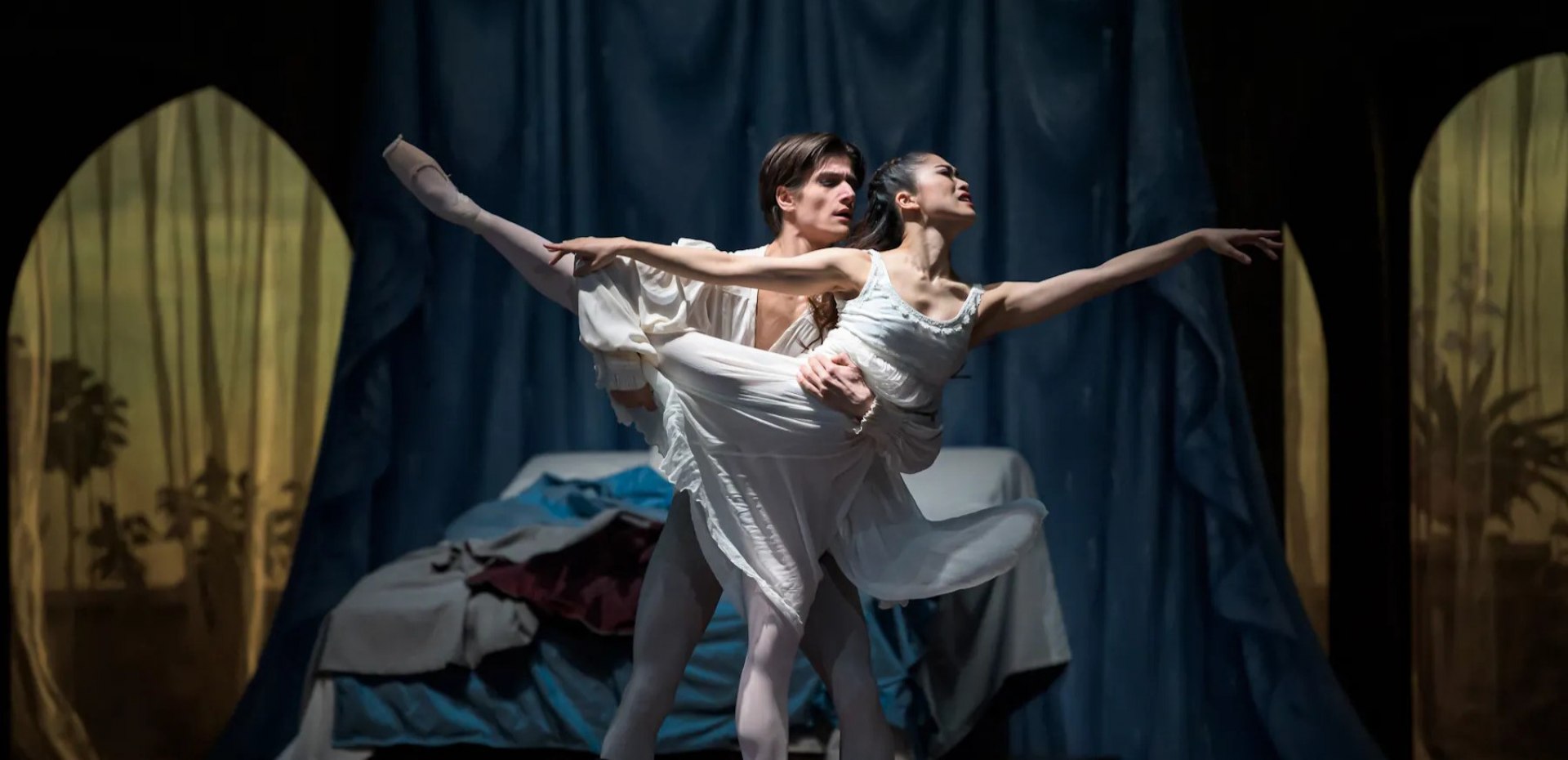Romeo and Juliet
September 2025 | ||||||
|---|---|---|---|---|---|---|
Mo | Tu | We | Th | Fr | Sa | Su |
Romeo and Juliet – Sergei Prokofiev | Ballet
Choreography by John Cranko, based on the play by William Shakespeare
Approximate running time: 2 hours 30 minutes, including two 20-minute intermissions
Ever since its premiere eight decades ago, Sergey Prokofiev’s Romeo and Juliet has been performed by renowned companies worldwide, as one of the pillars of the classical ballet repertoire.
John Cranko originally created an adaptation of Romeo and Juliet for the ballet company of La Scala in Milan, whose production featured the celebrated prima ballerina Carla Fracci and the dancer Mario Pistoni in the title roles. Four years later, in 1962, the Stuttgarter Ballett, which he helmed, presented a revised version, starring Márcia Haydée and Ray Barra. Cranko’s production is still immensely popular and part of the repertoire of numerous globally renowned companies (National Ballet of Canada, Australian Ballet, Paris Opera Ballet, Vienna State Ballet, Joffrey Ballet in Chicago, Teatro Municipal de Santiago in Chile, Finnish National Ballet, National Ballet of China in Beijing, Bavarian State Ballet, Boston and Washington Ballets, etc.).
Our new production of Cranko’s adaptation of William Shakespeare’s immortal tale, forcibly conveying human emotions, features the globally renowned designer Jürgen Rose’s original enthralling sets and costumes.
Suitable for audience from 12 years
Program and cast
Lord Capulet - Marek Svobodník; Jiří Kodym; Fraser Roach; Radek Vrátil
Lady Capulet - Miho Ogimoto; Michaela Černá; Kristina Kornová; Romina Contreras; Tereza Podařilová
Juliet - Aya Okumura; Alina Nanu; Romina Contreras; Haruka Iguchi; Nina Fernandes; Ayaka Fujii; Evgeniya Victory Gonzalez
Tybalt - Sami Gossart; Paul Tudor Moldoveanu; Marek Svobodník; Giovanni Rotolo; Fraser Roach
Count Paris - Robert Jerjen; Jonáš Dolník; Danilo Lo Monaco; Marco Piraino; John Powers
Nurse - Klára Jelínková; Nelly Danko; Michaela Černá
Lord Montague - Fraser Roach; John Powers; Marek Svobodník; Ole Johannes Slåttebrekk
Lady Montague - Natálie Trešlová; Rachel Hickey; Monika Hejduková; Kristina Kornová
Romeo - Federico Ievoli; Paul Irmatov; Patrik Holeček; Erivan Garioli; Adam Zvonař
Mercutio - Erivan Garioli; Matěj Šust; Paul Irmatov; Ryo Hinoue; Elias Frantziskonis; Giovanni Rotolo
Benvolio - Francesco Scarpato; Giacomo De Leidi; Ryo Hinoue; Robert Jerjen; Roger Duart
Duke of Verona - Mathias Deneux; Alexey Afanasiev; Edward Harper
Friar Laurence - Mathias Deneux; Alexey Afanasiev; Edward Harper
Rosaline - Yujin Kim; Anna Dal Castello; Monika Hejduková; Chihiro Sudo
Gypsy Women - Nina Fernandes; Natsuki Nishiyama; Anna Novotná; Aya Okumura; Elena Dombrowski; Alexandra Pera; Anna Dal Castello; Eriona Bici; Olga Bogoliubskaia; Chihiro Sudo
Carnival King - Luca Novello; Danilo Lo Monaco; John Powers
Music: Sergei Prokofiev
Choreography: John Cranko
Choreology and staging: Jane Bourne
Staged by Filip Barankiewicz
Sets and costumes: Jürgen Rose
Light design: Jürgen Rose, Valentin Däumler
Costume supervision: Diana Eckmann
Sets reconstruction: Martin Černý
Ballet master: Alexey Afanasiev, Michaela Černá, Nelly Danko, Jiří Kodym, Tereza Podařilová
Music preparation, conductor: Václav Zahradník
Artists of the Czech National Ballet
Students of the Dance Conservatory of the Capital City of Prague
External members
State Opera Orchestra
Prague State Opera
The State Opera today
The State Opera (formerly the State Opera Prague, between 1948 and 1992 the Smetana Theatre, and originally the New German Theatre) has been a part of the National Theatre since 2012. The Opera and Ballet ensembles give repertory performances at the State Opera.
History
The Prague State Opera resides in the building which on January 5, 1888 was opened as a Prague German stage with the performance of Wagner’s opera, The Mastersingers of Nürnberg. In the 19th century, Prague Germans performed in the Estate’s Theater in alternation with a Czech company. Desire for their own theater led to negotiations in 1883 for the construction of a new theater building for the German Theater Association. Over the next three years, a blueprint was drawn up and handed over to the Vienna atelier of Fellner and Hellmer. Also sharing in the design was the architect of the Vienna Municipal Theater, Karl Hasenauer, while Prague architect Alfons Wertmüller took part in the construction. Financing came from private collections. With its spacious auditorium and neo-Rococo decoration, this theater building is among the most beautiful in Europe.
Access:
By car
On Wilsonova street, from the left lane close to the State Opera building take the slip road to the Slovan above-ground garage. The parking fee is 40 CZK/h.
By tram
By daytime tram No. 11 to the stop “Muzeum”, through the underpass beneath Legerova street in the direction of the NationalMuseum, at the crossroads turn right along the NewBuilding of the NationalMuseum.
By daytime trams Nos. 3, 9, 14 and 24 or night trams Nos. 51, 52, 54, 55, 56 and 58 to the stop “Václavské náměstí”, then by foot uphill on the left side of the Wenceslas Square to the traffic lights across Wilsonova and Vinohradská streets. Then turn left along the NewBuilding of the NationalMuseum.
By metro
To the “Muzeum” station, lines A and C (green and red), and then by foot along the NewBuilding of the NationalMuseum.

 EN
EN DE
DE IT
IT FR
FR ES
ES RU
RU JP
JP RO
RO
 Seating plan
Seating plan